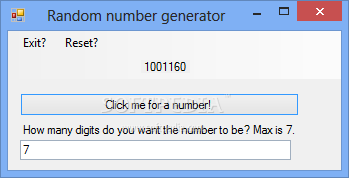
Note that by generating random numbers between zero and one, we can scale the result up to whatever size we need by multiplying the random number with another number. The first (and simplest) use case for the Math.random() method is generating random decimal or floating point numbers between zero and one: const randomNumber = Math.random()Ĭonsole.log(randomNumber) outputs -> //0.8446144685704831 Some of the use cases for this method are explained below. The seed represents the starting point for a hidden sequence of numbers uniformly generated over a specified range. Math.random() returns a non-cryptographic random number, which starts from a hidden internal representation called a “seed”. Use cases for the Math.random() method in JavaScript But before that, let us examine some of the basic use cases of the Math.random() method, so we can learn the simplest way of generating random numbers in JavaScript. In this article, we are going to focus on the recommended approach for these cases. What I mean is that we want random numbers that cannot easily be guessed via a pattern, or that end up repeating over time. However, while the pseudo-random numbers generated by Math.random() are usually sufficient in most cases, sometimes we need a cryptographically secure source of random number generation.

As you may know, it is difficult for computers to generate truly random numbers.

This is because it is pseudo-random over time, the numbers will begin to repeat and eventually display a non-random pattern. While there are different ways of using this method to yield random results over certain ranges, Math.random() is not a true random number generator. In mathematical terms, this is represented as 0 >= x < 1. The Math.random() method returns a decimal number or floating-point, pseudo-random number between zero (inclusive) and one (exclusive). The random() method helps us generate random numbers, as the name implies. In JavaScript, we have the native implementation of the random() method in the Math object, a built-in object that has properties or methods for performing mathematical calculations. Typically, we need random numbers for game functions like dice or raffles, private key generation, or other similar programs that require a cryptographically secure source. There are a several use cases in which a program might require a secure source of random number generation.
Random numbers generator generator#
Building a random number generator with JavaScript and Node.js

React, Node.js, Python, and other developer tools and libraries.
Random numbers generator software#
Alexander Nnakwue Follow Software engineer.


 0 kommentar(er)
0 kommentar(er)
